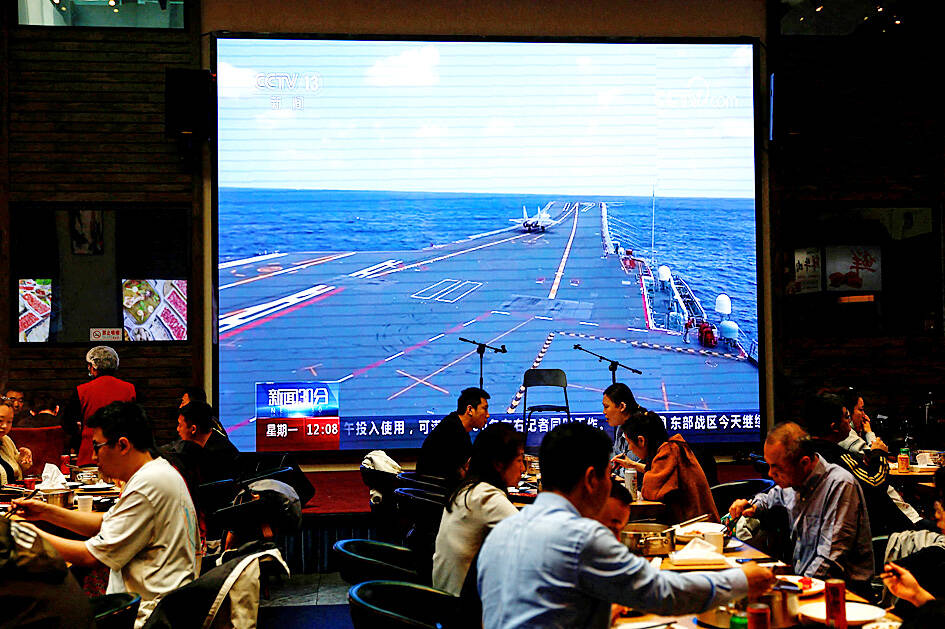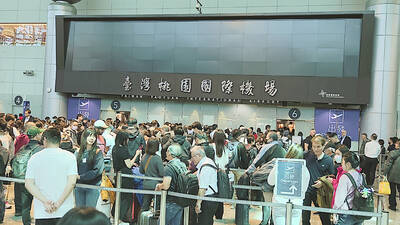The Chinese People’s Liberation Army’s (PLA) latest round of military exercises revealed a new strategy in Beijing’s campaign of intimidation against Taiwan, a defense expert said.
Last month, China launched a three-day drill following President Tsai Ing-wen’s (蔡英文) meeting with US House of Representatives Speaker Kevin McCarthy in the US, National Defense University researcher Ma Chen-kun (馬振坤) wrote in an article published in the Mainland Affairs Council’s (MAC) latest briefing.
These exercises, named “joint sword,” included 232 air sorties — 134 of which crossed the median line of the Taiwan Strait — but did not feature the use of exclusion zones or live-fire maneuvers, he said.

Photo: REUTERS
The drills suggest that the PLA has adopted a strategy to regularly and without warning conduct preparedness patrols around Taiwan proper, which cements the notion that the Taiwan Strait is part of China’s territorial waters, he said.
The intended effect of this is to compress Taiwan’s air-sea defensive depth, which allows the PLA to project power into the western Pacific Ocean, and potentially launch an invasion during a supposed patrol, Ma said.
The strategic implications of the preparedness patrols are more of a threat to Taiwan’s security than the high-profile live-fire drills of the past, due to the possibility that the PLA could use the exercises as a smokescreen for an attack, he said.
The PLA likely dispensed with firing missiles during the exercises to avoid raising unwanted attention from the international community, which was counterproductive, he said.
The Chinese forces that took part in the drills conducted rehearsals of maneuvers that would be used in an attack on Taiwan proper, he said, adding that the PLA demonstrated improved capabilities to prevent US forces from aiding the nation.
Although China’s aircraft carriers are inferior to the US’, the PLA could deploy more modern warships, submarines, and ground and air-launched anti-ship missiles, as it would be closer to the warzone, he said.
The PLA is in a stronger position against the US than ever before, and it has capacity for deterrence that it did not have during the 1996 Taiwan Strait Crisis, Ma said.
The urgency displayed by the US in efforts to stock Taiwan with secure ammunition storage is an indication of the dangers, he said.
China’s aggressive use of military exercises not only breached the tacit understanding between Taipei and Beijing to respect the median line, but also significantly increased the risk of inadvertently triggering a conflict through mishap, he said.
The PLA would likely refrain from carving out exclusion zones when it uses military drills to threaten Taiwan, to avoid international censure that disrupting sea communications would spark, he said.
Beijing would exert pressure by increasing the frequency and size of war games, he said.

The National Immigration Agency (NIA) said yesterday that it will revoke the dependent-based residence permit of a Chinese social media influencer who reportedly “openly advocated for [China’s] unification through military force” with Taiwan. The Chinese national, identified by her surname Liu (劉), will have her residence permit revoked in accordance with Article 14 of the “Measures for the permission of family- based residence, long-term residence and settlement of people from the Mainland Area in the Taiwan Area,” the NIA said in a news release. The agency explained it received reports that Liu made “unifying Taiwan through military force” statements on her online

A magnitude 5.7 earthquake struck off Taitung County at 1:09pm today, the Central Weather Administration (CWA) said. The hypocenter was 53km northeast of Taitung County Hall at a depth of 12.5km, CWA data showed. The intensity of the quake, which gauges the actual effect of a seismic event, measured 4 in Taitung County and Hualien County on Taiwan's seven-tier intensity scale, the data showed. The quake had an intensity of 3 in Nantou County, Chiayi County, Yunlin County, Kaohsiung and Tainan, the data showed. There were no immediate reports of damage following the quake.

Actor Darren Wang (王大陸) is to begin his one-year alternative military service tomorrow amid ongoing legal issues, the Ministry of the Interior said yesterday. Wang, who last month was released on bail of NT$150,000 (US$4,561) as he faces charges of allegedly attempting to evade military service and forging documents, has been ordered to report to Taipei Railway Station at 9am tomorrow, the Alternative Military Service Training and Management Center said. The 33-year-old would join about 1,300 other conscripts in the 263rd cohort of general alternative service for training at the Chenggong Ling camp in Taichung, a center official told reporters. Wang would first

MINOR DISRUPTION: The outage affected check-in and security screening, while passport control was done manually and runway operations continued unaffected The main departure hall and other parts of Terminal 2 at Taiwan Taoyuan International Airport lost power on Tuesday, causing confusion among passengers before electricity was fully restored more than an hour later. The outage, the cause of which is still being investigated, began at about midday and affected parts of Terminal 2, including the check-in gates, the security screening area and some duty-free shops. Parts of the terminal immediately activated backup power sources, while others remained dark until power was restored in some of the affected areas starting at 12:23pm. Power was fully restored at 1:13pm. Taoyuan International Airport Corp said in a